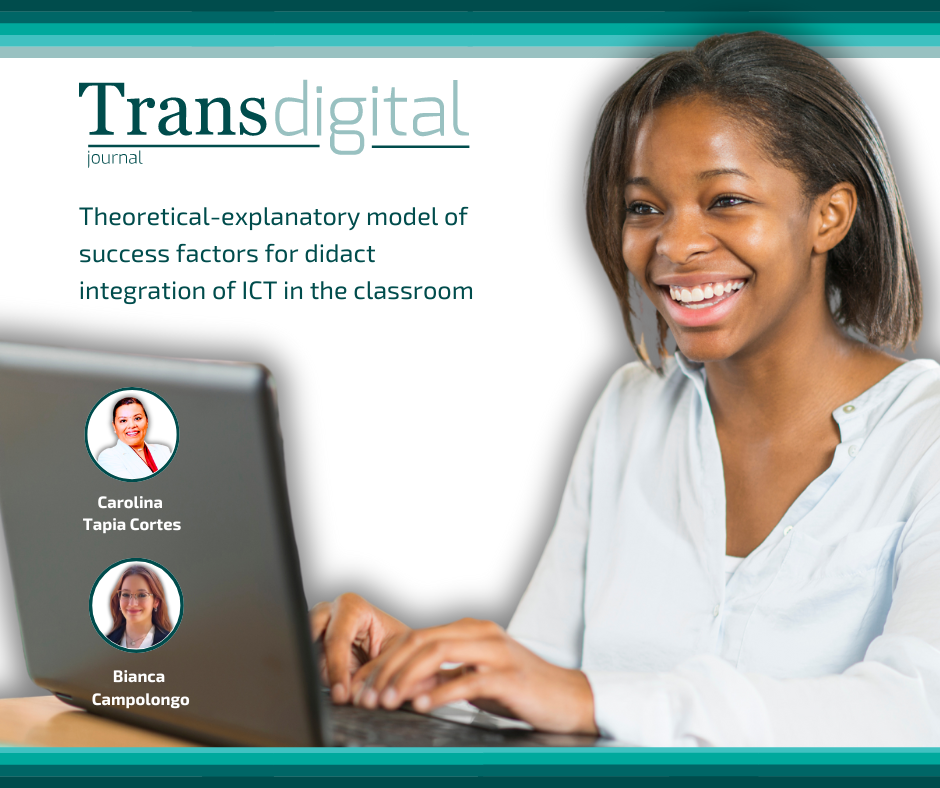Theoretical- explanatory model of success factors for didact integration of ICT in the classroom
DOI:
https://doi.org/10.56162/transdigital355Keywords:
ICT, teacher, teaching, didactic integration, didactic modelsAbstract
The arrival of information and communication technologies (ICT) into the educational field requires the creation of teaching models to facilitate their effective implementation by teachers. Therefore, this study developed a theoretical-explanatory model that identifies the key factors for the didactic integration of ICT in the classroom. This research had a qualitative, interpretive approach. To obtain the information, nine semi-structured interviews were carried out with experts in the use of ICT belonging to the University of Monterrey, Mexico. Likewise, three theoretical models related to the pedagogical integration of ICT in the educational environment were analyzed. The comparative method of Grounded Theory was applied to analyze the information obtained. A theoretical-explanatory model was proposed that includes four success factors: conceptualization of technologies, intensive integration of technologies, modes of use of technologies and steps for the didactic integration of technologies.
References
Andréu Abela, J., García-Nieto, A., Pérez Corbacho, A. M. (2007). Evolución de la teoría fundamentada como técnica de análisis cualitativo. Centro de Investigaciones Sociológicas.
Antenucci, D. (2020). Educación superior: sur, la pandemia y después. Mastozoología Neotropical, 27(1), 1-7. https://doi.org/10.31687/saremMN.20.27.1.0.01
Área-Moreira, M., Hernández-Rivero, V., & Sosa-Alonso J.J. (2016). Modelos de integración didáctica de las TIC en el aula. Comunicar, XXIV(47), 79-87. https://www.revistacomunicar.com/pdf/47/c4708es.pdf
Asabere, N., Togo, G., Acakpovi, A., Torby, W., & Ampadu, K. (2017). AIDS: An ICT Model for Integrating Teaching, Learning and Research in Technical University Education in Ghana. International Journal of Education and Development Using Information and Communication Technology, 13(3), 162–183. https://files.eric.ed.gov/fulltext/EJ1166618.pdf
Banco Mundial. (2020). Impacto de la Educación y respuestas de política pública. Grupo Banco Mundial: Educación. https://thedocs.worldbank.org/en/doc/454741593524928204-0090022020/original/Covid19EducationSummaryesp.pdf
Boude-Figueredo, Ó. R., Becerra-Rodríguez, D. F., & Rozo-García, H. A. (2021). Concepciones del proceso de evaluación del profesorado colombiano en tiempos de pandemia. Formación Universitaria, 14(4), 143–150.
Denzin, N. K. (1970). The Research Act: A Theoretical Introduction to Sociological Methods. Aldine Publishing Company.
du Plessis, M., Jansen van Vuuren, C. D., Simons, A., Frantz, J., Roman, N., & Andipatin, M. (2022). South African Higher Education Institutions at the Beginning of the Covid-19 Pandemic: Sense-Making and Lessons Learnt. Frontiers in Education, 6. https://doi.org/10.3389/feduc.2021.740016
Escudero Sánchez, C. L., & Cortez Suárez, L. A. (2018). Técnicas y métodos cualitativos para la investigación científica. Editorial UTMACH.
Guzmán Droguett, M. A., Cuéllar Becerra, C., Faúndez Bastías, M. P., & Lizama Zamora, C. (2021). Universidad y educación no presencial en contexto de pandemia: Desafíos a la gestión pedagógica en un marco de continuidad formativa. Revista Pedagogía Universitaria y Didáctica del Derecho, 8(1), 325–346. https://doi.org/10.5354/0719-5885.2021.58153
Izcara Palacios, S. P. (2009). La praxis de la investigación cualitativa: guía para elaborar tesis. Plaza y Valdés.
Jiménez-Becerra, I., & Segovia-Cifuentes, Y. M. (2020). Models of didactic integration with ICT mediation: some innovation challenges in teaching practices. Culture and Education, 32(3), 399-440.
Kozhuharova, G., & Ivanova, D. (2015). Didactic models for applying ICT in education. Trakia Journal of Science, 13(1), 462–467. https://doi.org/10.15547/tjs.2015.s.01.080
Martinez-Roig, R., Lorenzo Álvarez, C., & Mengual-Andrés, S. (2022). Preferencias hacia la futura formación online entre la juventud española a partir de su experiencia durante la pandemia: un estudio transversal. Edutec, Revista Electrónica de Tecnología Educativa, (81), 105–121. https://doi.org/10.21556/edutec.2022.81.2541
Ochoa Rocha, J. M. (2022). Teoría Fundamentada aplicada a las experiencias de profesores universitarios transversalizando la cultura de paz. Revista de Cultura de Paz, 6, 213–237. https://doi.org/10.58508/cultpaz.v6.136
Paudel, P. (2021). Online education: Benefits, challenges and strategies during and after COVID-19 in higher education. International Journal on Studies in Education (IJonSE), 3(2), 70-85. https://doi.org/10.46328/ijonse.32
Pérez Juste, R., Galán González, A. & Quintanal Díaz, J. (2012). Métodos y diseños de investigación en educación. Propósitos y Representaciones, 1(1), 173–184. https://doi.org/10.20511/pyr2013.v1n1.14
Solis Chuquiyauri, Z., Rivera Castañeda, P. M., García Palacios, C. A., & Tejada Arana, A. A. (2022). Práctica docente en instituciones de educación superior en tiempos de COVID-19. Revista Universidad y Sociedad, 14(S2), 532-539. https://rus.ucf.edu.cu/index.php/rus/article/view/2823

Downloads
Autor de correspondencia
El autor de correspodencia se identifica con el siguiente símbolo: *Published
How to Cite
License
Copyright (c) 2024 Carolina Tapia Cortes, Bianca Campolongo

This work is licensed under a Creative Commons Attribution 4.0 International License.
All articles in Transdigital are licensed under a Creative Commons Attribution 4.0 International License. Authors hold the copyright and retain publishing rights without restrictions.









